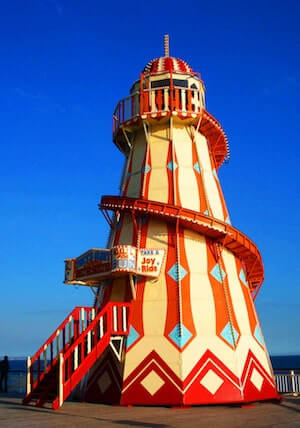Helter-skelter
What's the meaning of the phrase 'Helter-skelter'?
'Helter-skelter' means 'pell-mell - in chaotic and disorderly haste'.
Also, a Helter-Skelter is the name of an English fairground attraction with a spiral slide.
What's the origin of the phrase 'Helter-skelter'?
 Those of a certain age might remember The Beatles' song from the 1968 White Album - Helter Skelter. If so, the song's lyrics may also evoke memories of clinging on to hessian mats and spiralling down fairground slides.
Those of a certain age might remember The Beatles' song from the 1968 White Album - Helter Skelter. If so, the song's lyrics may also evoke memories of clinging on to hessian mats and spiralling down fairground slides.
Helter-Skelter slides began appearing at British fairs around the turn of the 20th century. In 1906, the UK newspaper The Westmorland Gazette included this:
"The World's Manufacturing Company, examples of whose 'helter-skelter' lighthouses are at Earl's Court, Blackpool, Southport, and other places."
(Note - apropos of nothing in particular: 'The World's Manufacturing Company' - it's been some years since a British company had the confidence to call itself something like that.)
Does the phrase helter-skelter derive from the slides' name? No, it's the other way about - the phrase came first. So, beyond the fairground, what is helter-skelter?
The term long pre-dates the fairground ride and has been used to mean disorderly haste or confusion since at least the 16th century. Thomas Nashe used it that way in his 'Four letters confuted', 1592:
"Helter skelter, feare no colours, course him, trounce him."
('To confute' is, or rather was, as it has been used only rarely since the 17th century, 'to render futile', 'to prove an argument to be false'.)
Shakespeare, always ready to appropriate colourful new language, used the term a few years later in Henry IV, Part. 2, 1600 :
Helter skelter, haue I rode to thee, and tidings do I bring.
Helter-skelter has been in common use in England for the past 400 years and has been known in the USA since the 1820s.
Neither helter nor skelter had any meaning in themselves. Like many word pairs of this sort (called rhyming reduplications), they only exist as part of the pair - although skelter was used alone later, but only as a shortened form of helter-skelter.
Another reduplication with a similar meaning is pell-mell (a confused throng or, in disordered haste). This originated around the same time - the first recorded use dates from 1579. Others which came later, but which are in shouting distance in terms of meaning, are harum-scarum (reckless rowdiness) and hurly-burly (commotion and confusion).
 The expression 'Helter-skelter' had something of a renaissance in the late 1960s when the American Charles Manson, the leader of the notorious Family cult, began using it as his name for the apocalyptic war between whites and blacks which he believed was soon to break out. Manson interpreted many of the lyrics in Beatles' songs to suit his maniacal predictions. In particular, the reference to going up and down the helter-skelter slide in Helter Skelter he believed was a prediction of his Family's appearance from the Bottomless Pit.
The expression 'Helter-skelter' had something of a renaissance in the late 1960s when the American Charles Manson, the leader of the notorious Family cult, began using it as his name for the apocalyptic war between whites and blacks which he believed was soon to break out. Manson interpreted many of the lyrics in Beatles' songs to suit his maniacal predictions. In particular, the reference to going up and down the helter-skelter slide in Helter Skelter he believed was a prediction of his Family's appearance from the Bottomless Pit.
See other reduplicated phrases.

